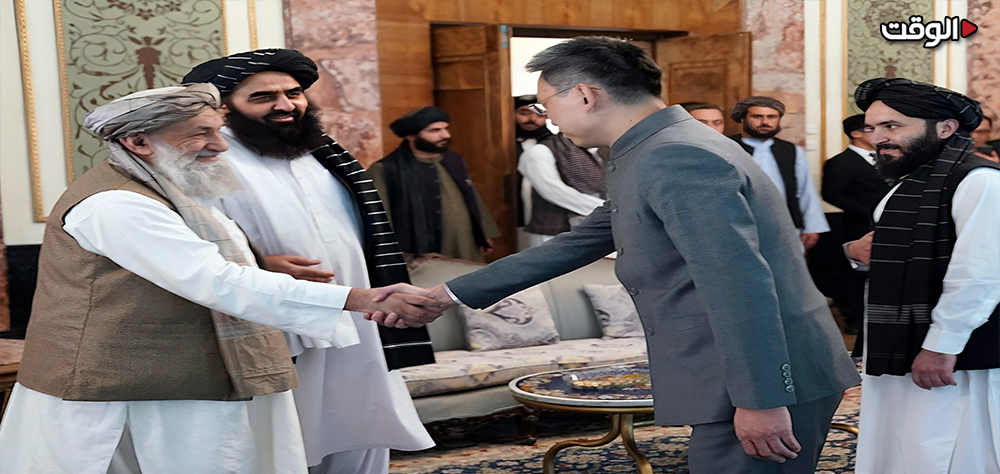At present, the Afghan Taliban operates embassies in 14 nations, such as Pakistan, Uzbekistan, and Tajikistan, yet host governments have refrained from publicly acknowledging the Taliban.
ALWAGHT- It has been over two years since the Taliban regained power in Afghanistan, and China has emerged as the first major nation to address the legal status of the new Afghan government decisively. President Xi Jinping of China officially accepted the ambassador's credentials from the Taliban representative after their meeting, signifying Beijing's acknowledgment of Taliban authority in Kabul. The Taliban's Ministry of Foreign Affairs in Afghanistan has appointed Maulvi Asadullah as the fully authorized ambassador to China.
In contrast, Wang Wenbin, the spokesperson for China's Ministry of Foreign Affairs, noted Beijing's ongoing diplomatic relations with Kabul but refrained from confirming recognition of Taliban rule, characterizing it as "routine diplomatic arrangements."
Despite the Taliban's control over Kabul, countries like China, Pakistan, and Russia, among others, have maintained operational embassies in Afghanistan. Nevertheless, the Taliban has progressively assumed authority over various Afghan diplomatic missions abroad, particularly in neighboring countries. Consequently, the Afghan Taliban currently operates embassies in 14 nations, including Pakistan, Uzbekistan, and Tajikistan, although governments in host countries have yet to officially recognize the Taliban.
China's initiative in the region
As foreign governments acknowledge the Taliban, there's a potential for lifting banking sanctions against the Taliban-led Afghan government, thereby allowing access to around $7 billion in central bank assets. In anticipation of this, Beijing might assert to other nations the undeniable governance of the Taliban in Afghanistan, emphasizing that Afghanistan cannot be isolated internationally. China, situated as one of Afghanistan's immediate neighbors and a significant power, has signaled to the world its divergence from Western perspectives. This stance is notable as the Taliban faces stringent Western sanctions, yet China moves towards acknowledging them.
China's close ties with the Taliban occur amidst strained relations between the Taliban and Pakistan. With attacks within Pakistan and along the Afghan border, alongside the expulsion of Afghan refugees from Pakistan, Islamabad's relationship with Kabul is deeply fractured. One reason the Taliban hasn't controlled anti-Pakistan militants along the border could be the expulsion of Afghan refugees, which angered the Taliban. Pakistan, under these circumstances, has stated its reluctance to endorse international recognition of the Afghan Taliban.
Against this backdrop, it appears that China, as Afghanistan's influential neighbor, is taking steps toward recognizing the Taliban government—an action the Taliban welcomes.
China's guarantee of counterterrorism measures
By formally accepting a Taliban ambassador in Beijing, China is poised to strengthen its influence in Afghanistan. Zabihullah Mujahid, a senior Taliban spokesperson, stressed on the X network that China perceives something overlooked by the rest of the world, hinting at the significance of Beijing's support, which time will unveil.
Conversely, China's deepening rapport with the Taliban could mitigate the risk of Afghanistan being leveraged against China. Concerns about various terrorist factions in Afghanistan, particularly near borders, trouble all neighboring nations. Thus, China aims to bolster border security with Afghanistan by fortifying ties with the Taliban. Beijing prioritizes averting potential security threats originating from Afghan territory. Parallelly, countries like Russia and the United States have voiced apprehensions about Afghan-based terrorist entities, aligning with China's concerns. With increased proximity to the Taliban, Beijing's apprehensions are likely to ease.
Moreover, Beijing's active involvement with the Taliban and growing sway in Kabul could foster bilateral cooperation in counterterrorism efforts between China and Afghanistan when necessary. China, wary of the East Turkestan Islamic Movement (ETIM), previously sought aid from Afghanistan's former government. Fundamentally, China endeavors to prevent the spillover of armed activities from Afghanistan into Xinjiang along its borders.
The economic contribution of Beijing
Beijing's interest extends to various sectors including mining, manufacturing, agriculture, and services, while Afghanistan boasts valuable mineral resources like copper, lithium, and rare earth elements crucial for Chinese industries. With the recognition of the Taliban, China anticipates the lifting of sanctions against the Taliban government, facilitating Chinese traders to engage in agreements and international contracts within Afghanistan. Geopolitically, Afghanistan also serves as a potential channel linking China to West and Central Asia. Notably, the current Afghan Taliban administration aims to utilize the China-Kyrgyzstan corridor, potentially offering a more direct route compared to existing paths through Pakistani territory.
These developments coincide with Beijing's ongoing efforts to expand the China-Pakistan Economic Corridor (CPEC) as part of the Belt and Road Initiative (BRI) to bolster trade links with Afghanistan. Naveed Ali Sheikh, a researcher and military relations analyst, informed The New Arab that given delays in Chinese economic ventures in Pakistan and security challenges in Afghanistan, China swiftly engaged with the Taliban post-Ashraf Ghani government's collapse. Subsequently, Afghanistan's inaugural exports to China transpired in October 2021, astonishingly ferrying 40 tons of Afghan pine nuts via air freight.
Moreover, China eyes certain energy reserves in Afghanistan. China's Central Asia Petroleum and Gas Company (CAPIEC) has set its sights on the Amu Darya oil and gas fields in western Afghanistan, deserted by the United States, and secured a 25-year exploration pact with the Taliban.



























